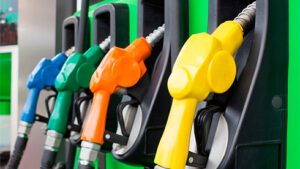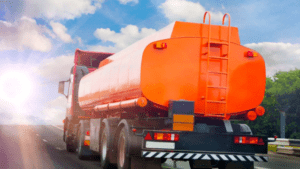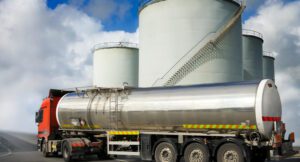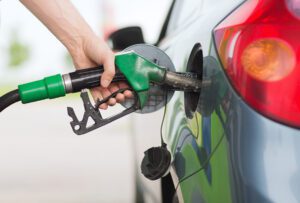
Ukraine, with the help of Western partners, has managed to significantly increase fuel imports from EU countries, as a result, in May the country will receive 350,000 tonnes of fuel via completely new logistics routes, the Ministry of Economy has said on its website.
“In March-April 2022, measures were introduced that made it possible to increase the daily volume of fuel imports from the EU from 4,000 tonnes to 12,000 tonnes per day,” the ministry said.
Among the measures taken that ensured such growth, the Ministry of Economy named the abolition of entry permits for tankers to deliver fuel to Ukraine, ensuring the ability to receive fuel in the ports of the Danube, adjusting the mechanism for price regulation of the cost of fuel and extraordinary clearance of fuel at the borders by customs and border guards.
“Thanks to this, five times more fuel was delivered to Ukraine by railroad. In March, 35,000 tonnes were delivered, in May we expect 180,000 tonnes. Imports by road increased 15 times – from 5,000 tonnes to 85,000 tonnes. Transportation by river now brings five times more fuel compared to March – from 4,000 to 22,000 tonnes,” First Deputy Prime Minister Yulia Svyrydenko, Minister of Economy, is quoted in the report.
According to the Ministry of Economy, there is also an agreement to start reversing fuel by pipe transport from Hungary: Ukraine received confirmation to import 35,000 tonnes per month, with a potential increase to 50,000 tonnes.
In addition, customs launched a separate green lane for fuel trucks from Poland, which will potentially increase the pass from 110 to 200 trucks per day.
“Today, the entire volume of imports can be directed to domestic consumption. Building up stocks requires more time. For queues and shortages to disappear, fuel supplies at filling stations are required for at least 15 days,” the ministry said.
Among the tasks for the near future, it named obtaining the consent of the EU countries for guaranteed acceptance of tankers with fuel for the Ukrainian market by their ports; the withdrawal of Russian and Belarusian fuel brought before the Russian invasion and now seized, the loading of the pipeline from Hungary with diesel, and the implementation of systemic purchases by NJSC Naftogaz Ukrainy.
“According to the updated forecast, consumption of 300,000 tonnes of diesel and 120,000 tonnes of gasoline is expected in May. Such a volume of imports has already been contracted by Ukrainian chains,” the ministry said.
At the same time, Svyrydenko said that attempts to sell fuel at prices above the maximum allowable – UAH 60, UAH 65 and even UAH 70 per liter – will be regarded “as looting.” “The government has given powers to regional military administrations to exercise control over price fixing. We will react harshly to such facts in accordance with wartime requirements,” the first deputy prime minister said.

President of Ukraine Volodymyr Zelensky has said that the government should speed up the transportation of fuel from European ports to Ukrainian consumers.
“The key task for government members is to speed up the transportation of fuel from European ports to our consumers. The volume of such transportation should increase daily,” Zelensky said in a traditional video message on Saturday.
He said that at present, everything is being done to ensure that the state fulfills all social obligations, despite the budget deficit due to the destruction of the Ukrainian economy by the Russian army.
At a meeting with members of the government on Saturday, Zelensky recalled that the issue of fuel shortage was raised last week. “At the beginning of last week, we agreed that we would resolve the issue this week. The week is ending,” Zelensky said.
In turn, First Deputy Prime Minister, Minister of Economy Yulia Svyrydenko called the main problem – the logistics of receiving fuel for Ukraine in Eastern European ports.
“If you look at imports, over the past five days we have been importing exactly the same amount, even a little more, than we consume. Europe was simply not ready: not even in terms of resources, but in terms of logistics. We have a bottleneck – these are ports, European ports,” she said.
“We have Gdansk, Gdynia, Swinoujscie, Constanta, Burgas – there is a traffic jam. We asked [Foreign Minister] Dmytro Kuleba to get involved already at the international level – to ask for a green corridor for Ukraine in these ports,” Svyrydenko added.

The Ministry of Infrastructure of Ukraine and the Ministry of Infrastructure and Development of Poland have agreed to cancel permits for all carriers engaged in international transportation of fuel, the press service of the Ministry of Infrastructure reported on Friday.
“Russian missile strikes on refineries and oil depots have created a critical situation in the fuel market. The goal of the team of the Ministry of Infrastructure in these conditions is the complete liberalization of international freight traffic to solve this problem. The new rules have already entered into force, and both Ukrainian and and Polish carriers. I am grateful to the Polish side for the constructive work,” Minister of Infrastructure Alexander Kubrakov is quoted as saying.
According to him, work will continue on simplifying cargo transportation and creating the most simple and understandable rules for carriers of goods necessary for Ukraine.
To enter the territory of Poland without a permit, fuel carriers must register by filling out the form: https://forms.gle/waid3FnRX1duve9z8
You must fill out the form no later than one day before crossing the border.
As reported, in April, Ukraine and Poland also agreed to increase the volume of rail transportation of Ukrainian exports to the EU and to world markets through Europe. In particular, the parties will set up a joint logistics venture in the near future.

During the period of Russian military aggression, Ukraine should allow the import and sale of fuel of the Euro-4 ecological standard, director of the A-95 consulting group Serhiy Kuyun said.
“It is necessary to temporarily allow the use of fuel of Euro-4 standards. The equipment of the Armed Forces of Ukraine will not notice this at all. Tanks, ZILs, diesel locomotives and others will go easily – this equipment is not new for the most part,” he wrote on his Facebook page.
“Civilian transport will also survive. Strict European fuel requirements are mainly for environmental purposes. Now there are much more serious threats to our life and health than the exhaust in traffic jams from refugees’ cars,” Kuyun said.
According to him, there are interesting price offers for Euro-4 on the foreign market, which will increase the filling of the Ukrainian market with fuel.

During the period of Russian military aggression, Ukraine should allow the import and sale of fuel of the Euro-4 ecological standard, director of the A-95 consulting group Serhiy Kuyun said.
“It is necessary to temporarily allow the use of fuel of Euro-4 standards. The equipment of the Armed Forces of Ukraine will not notice this at all. Tanks, ZILs, diesel locomotives and others will go easily – this equipment is not new for the most part,” he wrote on his Facebook page.
“Civilian transport will also survive. Strict European fuel requirements are mainly for environmental purposes. Now there are much more serious threats to our life and health than the exhaust in traffic jams from refugees’ cars,” Kuyun said.
According to him, there are interesting price offers for Euro-4 on the foreign market, which will increase the filling of the Ukrainian market with fuel.